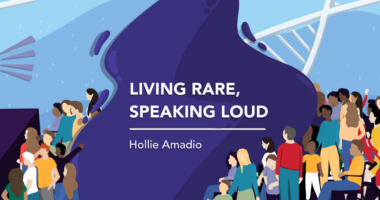
HAE awareness and advocacy: Creating connections
Last updated May 20, 2024 by Susie Strachan
When living with a chronic illness such as hereditary angioedema (HAE), connecting with a community of people living with the same condition can provide you with encouragement, empathy, and guidance, as well as ways to advocate for yourself and others.
HAE is a genetic condition that leads to sudden but temporary swelling affecting the deeper layers of the skin. It can often be managed with medication and by avoiding triggers.
Along with HAE support groups — both in-person and online — you can find organizations that offer financial assistance, opportunities to be an advocate for the HAE community, and information about the latest news and research into this chronic illness.
Finding a local support group
Support groups offer opportunities to exchange valuable information, HAE resources, and practical tips for managing HAE symptoms, swelling attack treatment options, and navigating the healthcare system.
Local groups might organize social activities, outings, or recreational events for members and their families.
Meeting face-to-face with other people living with HAE and caregivers in your local community allows you to establish personal connections, build relationships, and form friendships with others who understand what you are experiencing and the challenges.
To find a local support group, start by asking your healthcare team for recommendations. Healthcare clinics and hospitals may have a patient support center that can give referrals.
Reach out to HAE-focused patient advocacy organizations, as many offer local support groups or chapters. The US Hereditary Angioedema Association (HAEA) maintains a directory of local support groups.
Internationally, check these organizations for support groups in your country:
Accessing online support
Because HAE is a rare condition, being able to meet locally with other people who have it may not always be an option. But online HAE support groups offer a convenient alternative.
Just like in an in-person support group, you can learn from other’s experiences, strategies, and successes in managing the condition, including how to prevent HAE attacks and ways to manage swelling.
To find online support groups, start by connecting with national organizations such as HAEA, which offers groups for adults, children, and young adults.
You can also look for HAE support groups on social media platforms such as Facebook, Reddit, and Instagram. And try searching websites like Inspire, PatientsLikeMe, and RareConnect for HAE-specific discussion groups or forums.
Useful information for people with HAE
Reliable resources for information about HAE include government health agencies, HAE patient advocacy organizations, and your healthcare team.
Angioedema News is a good source for the latest news and information about treatment and other relevant topics.
The U.S. HAEA Angioedema Center at University of California San Diego has the latest information on the genetics of HAE and advancements in treatment. The American Academy of Allergy, Asthma & Immunology offer educational resources for healthcare professionals as well as people living HAE.
You can find information about research studies related to HAE at ClinicalTrials.gov, including learning about experimental treatments, new therapies, and clinical trials.
Financial assistance
There are a few organizations that can assist with paying for HAE treatment, medications, medical expenses, and other related needs.
The HAEA’s Chris Whalen HAEA Compassion Fund offers financial assistance for people who have to travel for HAE-related reasons, such as to see a specialist.
Another source of financial support for HAE is the Patient Advocate Foundation, a charity that offers co-pay relief.
Advocacy within the HAE community
By amplifying the voices of those living with HAE and their caregivers, advocacy efforts, including through international organizations, can boost awareness about the disease and raise funds for HAE research.
As an advocate, you can help educate healthcare providers, policymakers, and the general public about HAE by providing accurate information, resources, and educational materials.
The work may involve raising awareness about insurance coverage issues, advocating for legislation to support rare disease patients, or participating in patient access programs and initiatives.
By attending conferences and other HAE events, you can network with other people in the HAE community, share your experiences, and gain insights from experts.
Participating in HAE-related research studies, clinical trials, or patient registries can help you contribute to advancements in understanding, diagnosing, and treating the condition.
There are a number of other ways you can be involved in speaking up for the HAE community:
- HAE Day is an annual global awareness day in mid-May dedicated to raising awareness about HAE among the general public, healthcare professionals, and policymakers.
- HAE International posts an events calendar of conferences and other events around the world.
- HAEA offers a calendar of webinars, in-person community events, youth leadership training, and links to conferences such as the annual HAE International Regional Conference Americas.
Troyce Venturella has been a patient advocate with HAEA since 2015, working with patients and caregivers, providing connections to resources and talking about her own experience living with the disease.
“It’s good that people reach out to us,” she says. “We talk about everything from a new diagnosis, to getting plans in place for their child going to school, to the emotions of having passed the disease on to your child and how to cope with that.” She adds that better mental health is as much a goal as better physical health.
Venturella, who worked as a nurse before joining HAEA, says her job is to provide emotional support and practical advice. Being at HAEA has also helped provide perspective on her own life.
“When I was really sick, before I got on medication, I knew I needed to go to the hospital. But I hated going to the hospital. I didn’t want to be sitting on a gurney for hours, waiting,” she says. “My husband always hated that I wouldn’t give in to his urging. I had to learn the perspective of the caregiver, to see both sides of the story.”
Her favorite advice to people living with HAE who want to learn to advocate for themselves is to find and use their voice.
“You need to be able to speak up for yourself, to get the best medical care, and to talk to others about HAE. You can have what I call the ‘elevator story’ that’s a fast summary, and the ‘novelette’ that gives more information,” Venturella says. “It’s one of the best parts of being in a support group. So that everyone can learn to tell their own story, and meet other people and learn theirs.”
Staying informed
By actively seeking out information from multiple sources and staying engaged with the HAE community, you can keep updated about the latest developments in HAE and empower yourself to make informed decisions about your care and treatment.
Start by attending regular appointments with your healthcare team and asking questions about any new developments and HAE treatment options.
Angioedema News is a valuable source of information, including news and columns.
You can also sign up for email alerts or newsletters from patient advocacy organizations, medical journals, and healthcare institutions that provide updates on HAE news, research breakthroughs, and online resources.
Angioedema News is strictly a news and information website about the disease. It does not provide medical advice, diagnosis or treatment. This content is not intended to be a substitute for professional medical advice, diagnosis, or treatment. Always seek the advice of your physician or other qualified health provider with any questions you may have regarding a medical condition. Never disregard professional medical advice or delay in seeking it because of something you have read on this website.
Recent Posts
- Biocryst expands HAE treatment portfolio with Astria acquisition
- When executing a plan, each person must do the right job at the right time
- Blood pressure drug lisinopril causes gut swelling in man, 54, in rare case
- Rare Disease Week is an opportunity to show that rare is not invisible
- Case highlights rare, life-threatening reaction to common antibiotic




